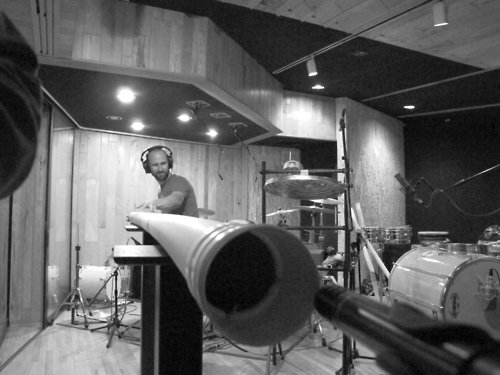The posters leap out at you from the side of every bus and billboards on every corner. And it’s no surprise, with an avalanche of five-star reviews and a cast of Hollywood hard-hitters. Looper is being hailed as the film to see in 2012. And that makes Chris Mears, percussion specialist and collaborator on the film’s score, very happy.
“It’s absolutely amazing,” he says, still buzzing from seeing the final cut for the first time with a gang of his friends in his home town of Bournemouth, where he works as a music producer and writer under the name Dear Music. “I felt a bit sceptical working on it – could it really be as big as we were hoping? Then it went massive, and I saw it and it’s really, really good.”
Looper, starring Bruce Willis, Joseph Gordon-Levitt and Emily Blunt, is an intense time-travel, sci-fi thriller, in which a hit man from the future travels back in time to kill himself. It’s definitely not conventional. And the same can be said for the score, which was performed on a base of their own custom drum section, made up of their recordings of implements including a microwave, fans, generators, and the railings outside the apartment where Chris stayed in LA with Nathan Johnson, the film’s composer.
“We had to consider the mechanics of time-travel and how that might sound in the context of the Looper universe,” says Chris. “It’s heavy, clunky, industrial.” The pair went on “rhythm reconnaissance missions” to hunt for things they could play – including to the hardware store Home Depot. “We found a plastic drainpipe and d iscovered that if you tapped the end of it, it came up with an amazing sound,” says Chris. “But the whole thing must have been 20 feet long and we only had Nathan’s car to get it home in, so we had to place it like an arrow through the heart of the car and drive it to the studio like that. “We thought it would be OK if we drove really slowly but we had to be really careful not to hit lampposts and cyclists – afterwards we thought, we’re definitely not doing that again!”
iscovered that if you tapped the end of it, it came up with an amazing sound,” says Chris. “But the whole thing must have been 20 feet long and we only had Nathan’s car to get it home in, so we had to place it like an arrow through the heart of the car and drive it to the studio like that. “We thought it would be OK if we drove really slowly but we had to be really careful not to hit lampposts and cyclists – afterwards we thought, we’re definitely not doing that again!”
They layered sample upon sample, slamming car doors, rattling chains and recording the sounds from a pocket-watch and a gun used in the film. Using a sample pad, they manipulated the sounds to act like a traditional drum kit and added Chris’s live performance over the top to give it an alive, dissonant edge.
Building on the film’s time travel theme, the pair became obsessive about timing, trying to compose as much as possible at 60 or 120 bpm. Then Nathan arranged traditional instrumentation over the top to complete the industrial, otherworldly track. It’s a method they first used in Bournemouth, where Nathan moved from the USA a decade ago to lead a small Christian community called Bliss. He and Chris met through Bliss and became firm friends and flatmates. “We had a real sense that we got each other when it came to music,” said Chris. “We both really care what something sounds like.”
When Nathan’s cousin, Rian Johnson, invited Nathan to work on his debut film, the neo-noir Brick in 2006, he asked Chris to be part of the team. Armed with a microphone and a computer, they recorded themselves bashing a radiator with a whisk, playing a piano with screws hanging from the strings and running their fingers around the rim of wine glasses – the “winophone”. The result was a haunting, beautiful soundtrack to a film that won the prestigious Sundance Festival’s special jury prize for originality of vision.
Nathan and Chris’s music has become a fixture of Rian’s movies. Their score for his next offering, The Brothers Bloom, was more traditional – Chris calls it a “vaudeville, old gypsy-type feel” – and Looper is their third project together.
Looper is in cinemas now.